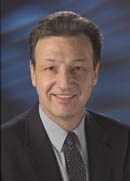Closing Reflections from the SSQ Program Originator
By W. Mark Richardson
 I write these remarks as one who helped to found and has been involved in leading the Science and Spiritual Quest project over the last eight years. These eight years have been a gift as I have watched the program grow from our original idea to something much larger than anything I could have conceived. SSQ has enriched the lives of so many people—from scientists, to conference guests, and the staff who executed the programs.
I write these remarks as one who helped to found and has been involved in leading the Science and Spiritual Quest project over the last eight years. These eight years have been a gift as I have watched the program grow from our original idea to something much larger than anything I could have conceived. SSQ has enriched the lives of so many people—from scientists, to conference guests, and the staff who executed the programs.
The SSQ vision was clear. We sought to bring leading scientists from around the globe and from many spiritual traditions into conversation with one another, using topics that would draw out the ultimate meaning of their science. We sought in small groups to develop a form of conversation appropriate to the context of religious pluralism: critical honesty, truthful presentation of one's personal views, and respect for those who hold widely differing views from one's own. We sought to gain a greater appreciation, both in ourselves and among the scientists involved, of the many angles on the science-religion relationship…the kinds of subtle missteps that can occur when the relationship is misunderstood...and the exhilaration of making sound connections never seen clearly before. We observed how one person's utterances might bring another person to fresh knowledge of his or her own tradition, even though the two come from vastly different spiritual backgrounds.
One cannot leave a project on which he has labored for close to a decade without a complex mix of thoughts and emotions.
Above all, I conclude my years with SSQ with tremendous respect and gratitude for the scientists who committed themselves to this project. The SSQ scientists were leading figures whose professional lives were filled with tremendous pressures and the time constraints that come inevitably with stature. Yet they wagered that this could be unique and meaningful conversation, they trusted the direction given to it, and they willingly dedicated many hours to conversations and reflection together. Many of them then accepted the sometimes uncomfortable exposure of presenting personal and intimate thoughts to other colleagues, in print, and at the large public events. They stepped beyond their professional expertise to address topics for which the only expertise is living life fully and seriously. I greatly admire the gift of their example, knowing that many others have received encouragement from the investment they made in SSQ.
I have always viewed SSQ as a means of providing a forum for scientists who cared about the spiritual dimension of their work but who lacked colleagues with whom to discuss it. Given the important role played by scientists in our culture, the simple act of offering a forum where they could make personal connections seemed significant enough on its own. I believe that over the seven years of SSQ we succeeded at this task. Forming communities of this sort develops slowly, however, and is sustained only with focused effort. This kind of exchange is not for those who are merely dazzled by a steady repertoire of new ideas and goals. I hope this community-building will find sustenance through other forums that emerge in the coming years.
When it comes to theoretical matters—topics where the sciences bear upon metaphysical and theological construction—I believe the SSQ workshops and conference discussions have had a significant impact in sharpening and moving the science-religion field forward. Prior to the SSQ program, theologians and philosophers relied on a much smaller community of scientists for this kind of integrative conversation. Now that SSQ has identified so many interested partners from within the sciences, there is an expanded community of scientists able to contribute to the quality of work in our field.
I will remember wonderful moments of laughter during a meal or after long hours of conversation...many hours of staff planning, research, and preparation...many late nights with SSQ leaders after a day's workshop, strategizing how to lead the conversation in new directions the next day. I will remember the rich exposure to cultural life and spiritual traditions in Asia, Europe and Africa. I will remember the faces of people at conferences—how they kept conversing in groups after sessions, or over coffee and bagels, and did not seem to want to go away. I will remember the nights before a big event wondering, "How are we possibly going to pull this off?!" —and then observing how the event took on a dynamic life of its own, as if to honor the dedicated hard work that got us there.
What the SSQ team discovered is that programs such as this are bigger than any one of us. I close with warm and hearty thanks to the hard work and dedication of this talented staff, which has my enduring respect and admiration. I will cherish the memory of pioneering this work with Bob Russell, whose stature, energy and intelligence made such an ambitious project possible and lent it respect. And I am thankful for and inspired by the leadership of Philip Clayton, who took the project to new heights, pushing the quality and excellence to new levels and over wider vistas during the last four years. His great dedication, intellectual range and creativity, has had an impact on everyone involved in SSQ2. All of us close the doors on the SSQ project having been forever changed by our participation in it.
W. Mark Richardson
This article appeared in the October 2003 edition of Research News and Opportunities in Science and Theology.
